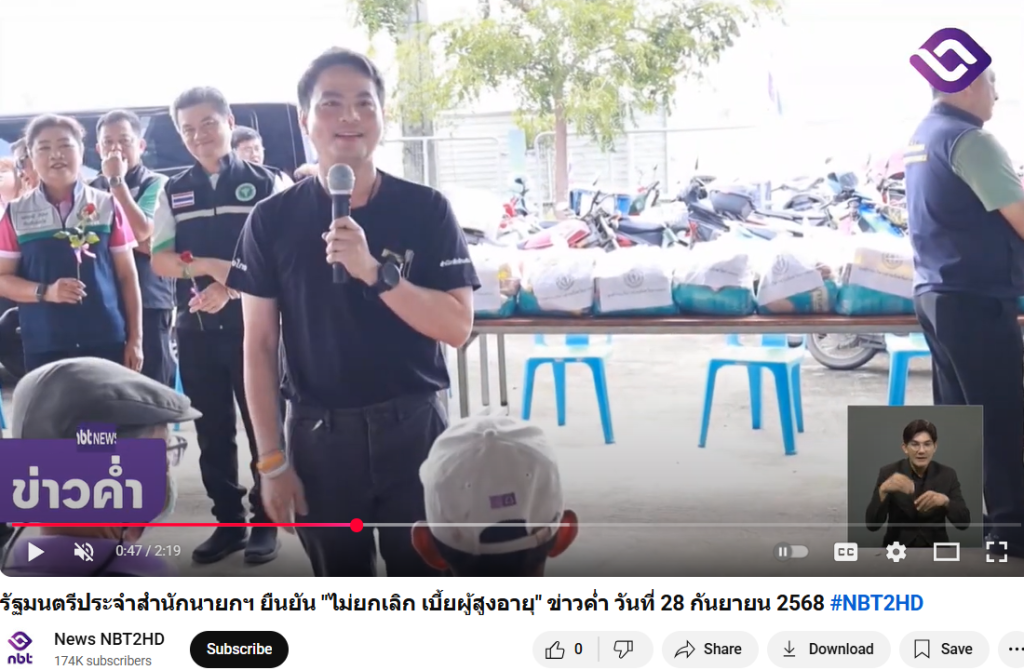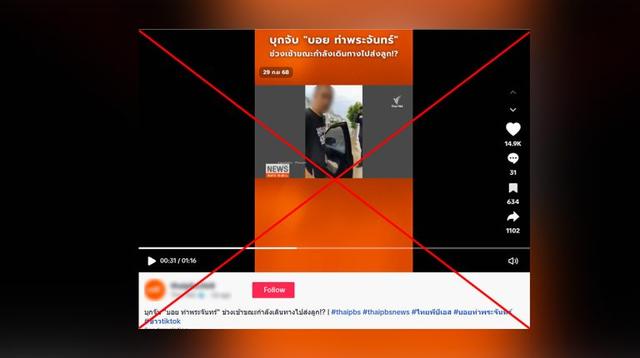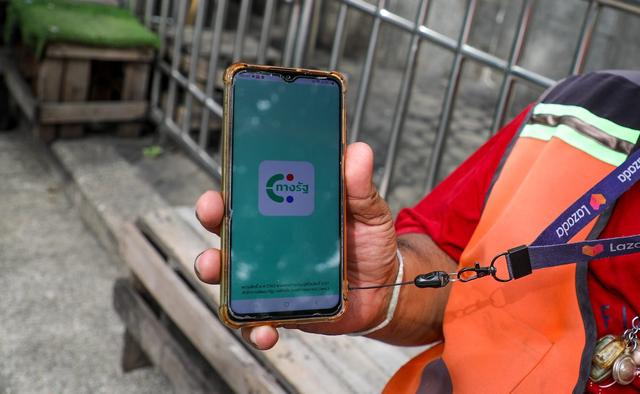Thai PBS Verify traced the source of the clip from: TikTok

A Screenshot of TikTok Account Claiming PM Anutin Cancelled Elderly Allowance
After assuming office as Prime Minister, one of Prime Minister Anutin Charnvirakul’s immediate tasks is to drive forward financial policy—both by introducing new measures and by revisiting previously successful policies to adapt them to current conditions. However, reports have surfaced suggesting that certain policies may face budget cuts, including the elderly allowance.
Thai PBS Verify identified a TikTok account named “Kampoon Homnet” that posted a video claiming Prime Minister Anutin would cancel the elderly allowance, with the caption:
“Anutin1 will cancel the elderly allowance—my taxes.” The clip drew significant attention, with 952,000 views, 6,876 likes, and 1,001 comments. Some commenters expressed disagreement with the alleged cancellation and stated they would not vote for Anutin as prime minister in the next election.
Evolution of Thailand’s Elderly Allowance Program
Thailand’s elderly allowance system was first introduced in 1992, based on the principle of providing welfare support to impoverished senior citizens. At the time, government assistance was allocated exclusively to low-income individuals. In 1997, the eligibility criteria were revised—raising the allowance rate and adjusting income thresholds—to extend coverage to a broader group of elderly citizens facing hardship.
In 2009, Thailand formally introduced the “universal elderly allowance” system. Under this policy, all citizens aged 60 and above became eligible to register for the allowance without having to prove financial hardship—except for those already receiving other state benefits. As a result, the number of recipients rose to over 5.6 million, covering approximately 80% of the country’s elderly population.
The government later revised the allowance rates to vary by age group and began discussing the possibility of upgrading the system into a “universal basic pension” to better align with Thailand’s rapidly aging society.
On August 11, 2023, the Royal Gazette published a new regulation issued by the Ministry of Interior outlining criteria for the disbursement of elderly allowances by local administrative organizations. The regulation was signed by then-Minister of Interior, Gen. Anupong Paochinda.
The core provisions stipulate that eligible recipients must be Thai nationals, listed in the household registration within the jurisdiction of the local administrative organization, and aged 60 or above. They must either have no income or earn below the threshold set by the Elderly Committee. Allowance eligibility will terminate upon death, disqualification, or voluntary withdrawal.
However, if an individual receives the allowance in good faith despite not meeting the criteria, local authorities will suspend future payments without demanding repayment. Those who registered and were receiving the allowance prior to this regulation will continue to receive it under the previous terms.
Civil Society Networks Protest New Elderly Allowance Regulation
Several civil society groups—including the Four Regions Slum Network, the People’s Welfare State Network, and We Fair—have voiced opposition to the newly issued regulation and submitted five key demands: repeal the new regulation and reinstate the universal allowance system; ensure the Elderly Committee protects existing rights; push for the allowance to become a legally supported universal basic pension; task the Ministry of Finance with identifying new tax sources to fund the program; and require the government to enshrine universal welfare in the constitution.
The Royal Gazette website has published the 2023 criteria for elderly allowance payments issued by local administrative organizations.
Thai PBS Verify confirmed that the Royal Gazette website did publish the Criteria for Elderly Allowance Payments Issued by Local Administrative Organizations B.E. 2566 (2023) on August 11, 2023.

Image showing the content of the Criteria for Elderly Allowance Payments Issued by Local Administrative Organizations B.E. 2566 (2023), as published in the Royal Gazette.
Elderly Will Continue Receiving Allowances—But Without Overlapping Other Welfare Benefits
Gen. Anupong Paochinda, then-Minister of Interior, clarified the 2023 regulation on elderly allowance payments published in the Royal Gazette. He emphasized that existing elderly recipients will continue to receive their allowances as before. The revision, he explained, stems from a ruling by the Council of State regarding overlapping benefits, prompting the need to align the regulation with existing laws and the constitution. The aim, he noted, is to ensure that low-income elderly individuals receive additional support—not to exploit the timing of a caretaker government. For new applicants turning 60, eligibility will be limited to those with no income or insufficient income. However, the National Elderly Committee has yet to finalize the specific criteria. Until then, current recipients will continue receiving their allowances without change. The responsibility for setting new eligibility guidelines will rest with the National Elderly Committee and the incoming Cabinet, based on principles of inclusivity and fairness.
Anutin Unveils Five Urgent Priorities—Advancing Economic, Social, and Security Policies with “Khon La Khrueng Plus” Prepared

Prime Minister and Minister of Interior, Anutin Charnvirakul
Thai PBS Verify reviewed Prime Minister Anutin’s policy statement to Parliament delivered on September 29, 2025, and found that it covered five key areas comprising 15 policy items. Notably, there was no mention of increasing or cutting elderly allowances, nor any reference to elderly-related policies. The only relevant item was an economic policy focused on stimulating income and reducing expenses through the “Khon La Khrueng Plus” co-payment scheme.
Bhumjaithai Party confirms it will not cancel the elderly allowance.

A news report from News NBT2HD on YouTube shows the Minister attached to the Prime Minister’s Office clarifying that the elderly allowance has not been canceled.
Mr. Paradorn Prissananantakul, Minister attached to the Prime Minister’s Office, confirmed that the circulating claims are false. He stated that the government has no intention of canceling the elderly allowance program. On the contrary, it is considering ways to expand benefits for senior citizens. He reassured the public that the monthly allowance remains unchanged under the current criteria: individuals aged 60–69 receive 600 baht per month, those aged 70–79 receive 700 baht, those aged 80–89 receive 800 baht, and those aged 90 and above receive 1,000 baht.
At the same time, Mr. Polpee Suwanchawee, Member of Parliament for Nakhon Ratchasima from the Bhumjaithai Party, addressed rumors circulating on social media that the government, under Prime Minister Anutin Charnvirakul, was planning to cancel the elderly allowance. He firmly stated that the claim is false and merely a piece of disinformation that distorts the facts. He emphasized that the elderly allowance is a fundamental welfare measure essential to quality of life, and the government has no intention of abandoning it. On the contrary, it is preparing to consider expanding benefits for senior citizens in the future.
What’s the real story ?
Following the publication of the Ministry of Interior Regulation in the Royal Gazette on August 11, the Criteria for Elderly Allowance Payments Issued by Local Administrative Organizations B.E. 2566 (2023) were updated. The main provisions specify that only senior citizens with no income or insufficient income are eligible to receive the allowance. This shift has sparked widespread public dissatisfaction with the new eligibility requirements.
The “elderly allowance cut” policy mentioned in the viral clip does not involve removing benefits from all existing recipients. Instead, it reflects a change in eligibility conditions—from a universal payment system to a means-tested approach. The revised criteria focus on supporting elderly individuals who are genuinely poor, ensuring they have sufficient income for daily living without becoming a financial burden on their families, and securing their right to a basic subsistence income.
At the same time, Prime Minister Anutin Charnvirakul, who also serves as Minister of Interior, officially announced his administration’s policies and began his duties in office. This has reignited public discussion on social media regarding the criteria for elderly allowance payments.










